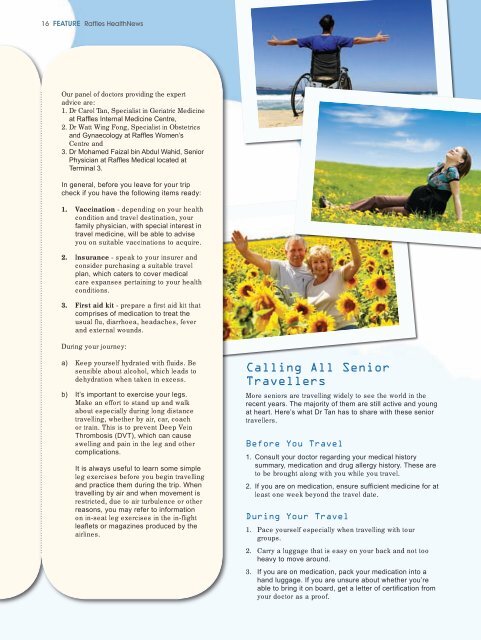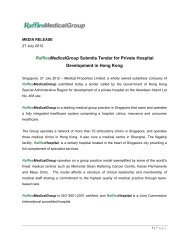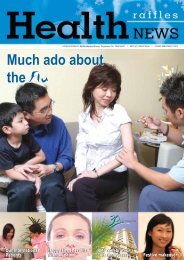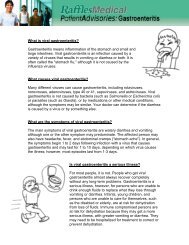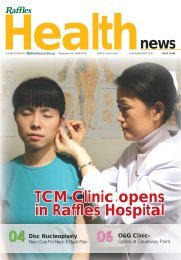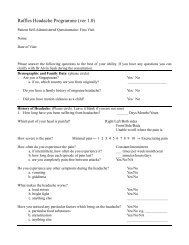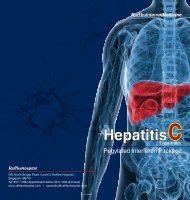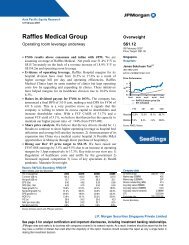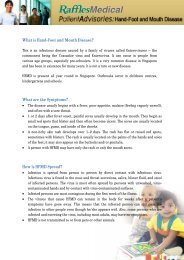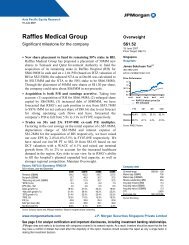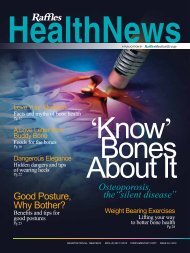REGISTRATION No. 198901967K MICA (P) - Raffles Medical Group
REGISTRATION No. 198901967K MICA (P) - Raffles Medical Group
REGISTRATION No. 198901967K MICA (P) - Raffles Medical Group
You also want an ePaper? Increase the reach of your titles
YUMPU automatically turns print PDFs into web optimized ePapers that Google loves.
16 Feature <strong>Raffles</strong> HealthNews<br />
Our panel of doctors providing the expert<br />
advice are:<br />
1. Dr Carol Tan, Specialist in Geriatric Medicine<br />
at <strong>Raffles</strong> Internal Medicine Centre,<br />
2. Dr Watt Wing Fong, Specialist in Obstetrics<br />
and Gynaecology at <strong>Raffles</strong> Women’s<br />
Centre and<br />
3. Dr Mohamed Faizal bin Abdul Wahid, Senior<br />
Physician at <strong>Raffles</strong> <strong>Medical</strong> located at<br />
Terminal 3.<br />
In general, before you leave for your trip<br />
check if you have the following items ready:<br />
1.<br />
2.<br />
3.<br />
Vaccination - depending on your health<br />
condition and travel destination, your<br />
family physician, with special interest in<br />
travel medicine, will be able to advise<br />
you on suitable vaccinations to acquire.<br />
Insurance - speak to your insurer and<br />
consider purchasing a suitable travel<br />
plan, which caters to cover medical<br />
care expanses pertaining to your health<br />
conditions.<br />
First aid kit - prepare a first aid kit that<br />
comprises of medication to treat the<br />
usual flu, diarrhoea, headaches, fever<br />
and external wounds.<br />
During your journey:<br />
a)<br />
b)<br />
Keep yourself hydrated with fluids. Be<br />
sensible about alcohol, which leads to<br />
dehydration when taken in excess.<br />
It’s important to exercise your legs.<br />
Make an effort to stand up and walk<br />
about especially during long distance<br />
travelling, whether by air, car, coach<br />
or train. This is to prevent Deep Vein<br />
Thrombosis (DVT), which can cause<br />
swelling and pain in the leg and other<br />
complications.<br />
It is always useful to learn some simple<br />
leg exercises before you begin travelling<br />
and practice them during the trip. When<br />
travelling by air and when movement is<br />
restricted, due to air turbulence or other<br />
reasons, you may refer to information<br />
on in-seat leg exercises in the in-flight<br />
leaflets or magazines produced by the<br />
airlines.<br />
Calling All Senior<br />
Travellers<br />
More seniors are travelling widely to see the world in the<br />
recent years. The majority of them are still active and young<br />
at heart. Here’s what Dr Tan has to share with these senior<br />
travellers.<br />
Before You Travel<br />
1. Consult your doctor regarding your medical history<br />
summary, medication and drug allergy history. These are<br />
to be brought along with you while you travel.<br />
2. If you are on medication, ensure sufficient medicine for at<br />
least one week beyond the travel date.<br />
During Your Travel<br />
1.<br />
2.<br />
3.<br />
Pace yourself especially when travelling with tour<br />
groups.<br />
Carry a luggage that is easy on your back and not too<br />
heavy to move around.<br />
If you are on medication, pack your medication into a<br />
hand luggage. If you are unsure about whether you’re<br />
able to bring it on board, get a letter of certification from<br />
your doctor as a proof.


